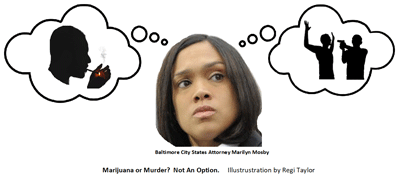“It’s counterproductive for us to continue to pursue and prosecute marijuana cases when we have the level of violence that is plaguing our communities, when we have homicide clearance rates that we still have to tackle,” was the response of Baltimore City States Attorney, Marilyn Mosby, to the ruling of judges from Baltimore’s District and Circuit courts denying her request to dismiss 4790 pot convictions.
Last Friday, Judges, W. Michel Pierson of the Circuit Court and Kathleen Sweeney of District Court denied the request Mosby made last January. The 1000 cases pending in Circuit Court and 3790 before the District Court were rejected out-of-hand by the jurists without allowing Mosby’s office to defend or refute the court’s decisions.
Judge Sweeney’s comments had a strident tone, bordering on personal: “Now, this same State’s Attorney claims that drug enforcement in Baltimore City, presumably her own efforts, have had a disparate impact on African-Americans,” Sweeney opined, referring to reports that Mosby’s policy immediately after assuming office was to crackdown on street drug sales in West Baltimore.
The judge further stated: “With 3,778 opportunities, the State fails to identify any actual single consequence suffered by any of these individuals,” noting that these same people would be eligible to possibly have their convictions expunged from their records by other means.
The City States Attorney has several valid arguments that refute Judge Sweeney’s claims. First, the issue of whether or not drug enforcement by Baltimore police has a ‘disparate impact on African Americans.’ It has been widely reported that despite former Governor Martin O’Malley’s decriminalization of Cannabis in 2014, the police department— not Mosby’s office— stepped-up arrests significantly.
Cannabis citations in Baltimore went from 44 in 2015 to 200 in 2016 to 544 in 2017. In 2017, according to FBI data, all but 18 of the 544 suspects arrested for Marijuana were African American— 96.7 percent, even though usage by African Americans and Caucasians has been determined to be essentially the same. The arrest results reflect the policy of Baltimore police to concentrate their enforcement in communities of color as substantiated by the Department of Justice’s 2015 investigation, which resulted in a consent decree.
Next, Judge Sweeney incredulously asserts that ‘the State fails to identify any actual single consequence suffered by any of these individuals.’ This position ignores the legitimate reason Mosby offered regarding how pot convictions inhibit citizen’s employment prospects.
This stigma is so pervasive that the city passed “ban the box” legislation restricting private employers from inquiring into criminal history of job applicants. Recognizing that three Baltimoreans are being arrested every two days on Marijuana charges, Marilyn Mosby was spot on in her request to the courts.
The City States Attorney’s most cogent explanation, which any Baltimore municipal judge should recognize and support, is the necessity to redirect resources from an activity which is on its way to becoming completely legal in the United States to address murder and other violent crime. Consider the homicide clearance rate that Mosby warns about:
The homicide clearance rate in 2018 was 43.4 percent, with 309 murders committed— meaning 175 killings went unsolved. In 2017, 51.3 percent versus 343 murders, 167 unsolved; 2016, 38.7 percent versus 318 murders, 195 unsolved; 2015, 30 percent versus 344 murders, 241 unsolved. In other words, Marilyn Mosby is sounding the alarm that there are as many as 778 murderers walking the streets of Baltimore and every resource, human and monetary, must be marshaled to solve these murders and protect citizens.
